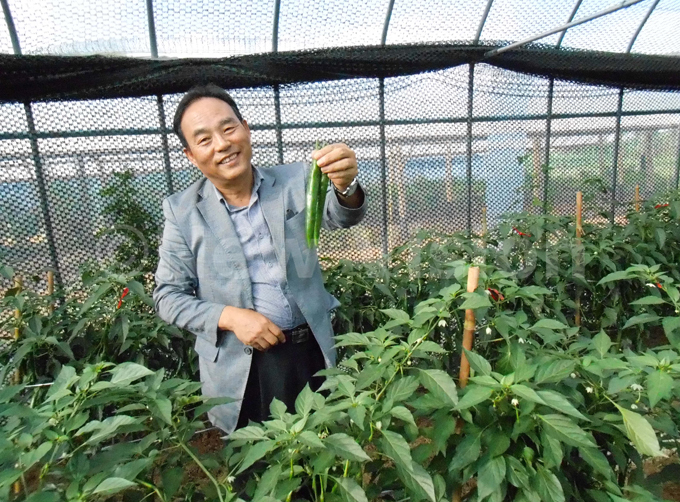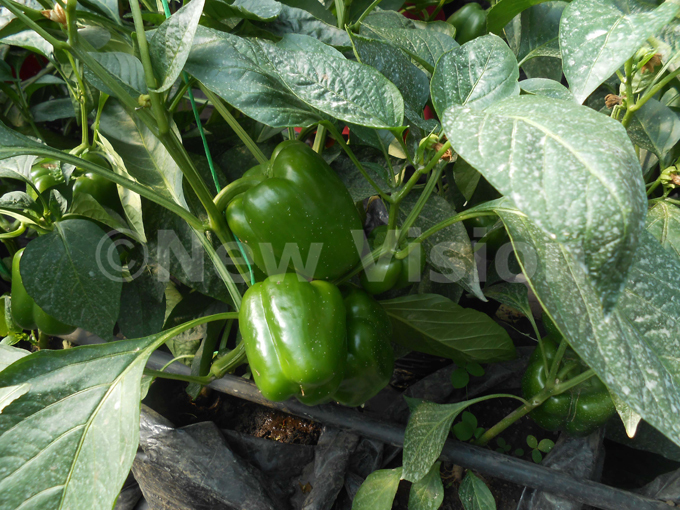Fruits and vegetable traders advised to form partnerships
This is the only way the issue of capacity to meet demands of those markets in terms of quality and quantity will be addressed.
Suppliers of fruits and vegetables have been advised to form partnerships so as to penetrate regional markets such as Common Market for Eastern and Southern Africa (COMESA) and the East African Community (EAC) before supplying European countries.
This is the only way the issue of capacity to meet demands of those markets in terms of quality and quantity will be addressed.
 Dr.Jee Hyeong Jin of the National Farmers Leadership center showing some of the vegetables that are on demand
Dr.Jee Hyeong Jin of the National Farmers Leadership center showing some of the vegetables that are on demand
The call was made by the executive director, Private sector foundation, Gideon Badagawa, at the second phase of the COMESA Business Council Local sourcing for Partnerships workshop, at the Kampala Serena Hotel.
The local sourcing for Partnerships project is aimed at promoting local sourcing by corporate companies from small agriculture enterprises with in the country.
"We want to propel you into bigger markets in the region, the question that arises is the capacity to meet the demand in those markets in terms of quality and standards," said Badagawa.
Uganda is one of the 6 countries where the pilot project is being implemented and it comes at a time when Uganda is promoting the Buy Uganda Build Uganda Policy that is promoting consumption of goods made in Uganda, "But we cannot leverage these wider markets if we cannot sustain domestics markets in terms of supplies. To maintain such markets, issues like standards, frequency of supplying and working in groups to get the quantities required will have to be worked," said Badagawa.
He cited the example of big companies like Mukwano group of companies, working without growers to make sure they have constant supply of raw materials especially the oil seeds.
"The project will help us understand what is needed so as to work backwards and improve the supply chain especially in agriculture products where we are not performing well," he added.
The project focuses on building technical capacity of selected enterprises, while brokering partnerships with the buyers to as to integrate SME's into the supply chains of corporate companies.
The project is being implemented in six countries which include Rwanda, Uganda, Kenya, Zambia, Ethiopia and Malawi.
Commissioner internal trade, Cyprian Batala attacked buyers of goods for delaying to pay their suppliers. Most companies buying goods from Ugandans pay after 60 days which Batala thinks is unrealistic.
"It is an omission that is not good for partnerships, the ideal situation is to pay in time so that these people can continue running their business," he said.

Why local sourcing
CBC executive director Sandra Uwera said Africa is becoming a hub for international trade therefore local companies must step up their game so as to beat the competition from foreign industries.
For quick supply, delivery of items, reduced transport costs, elimination of import duties also helps in maintaining quality along the supply chain.
She however noted that SMEs supplying agro products still have challenges in packaging, quality, standards, traceability and inconsistencies in delivery.
'That is why many companies are hesitant to form partnerships with smaller companies, until they are ready to adhere to requirements of the buyer,' she added.
Since the project started in April this year, ten MOUs have been signed between the big buyers and suppliers. These include two in Zambia, three in Rwanda, one in Kenya, and three in Uganda, One Malawi.
The project is an initiative by COMESA BUSINESS COUNCIL with support from the Investment Climate Facility for Africa (ICF), USAID, IPAA and the Private sector who are members of CBC.
Statistics from COMESA indicate that there are 480 million consumers in the region. These generated a total of 307 billion dollars from trade in 2014. While intra - COMESA trade earned the region 23 billion dollars, the same year.